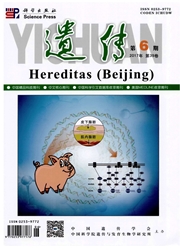

 中文摘要:
中文摘要:
MicroRNAs, a class of endogenous non-coding small RNAs about 21 nucleotides in length, play pivotal roles in plant physiological and biochemical processes. Tomato is important economic crop throughout the world. Recently, involvement of miRNAs in tomato has received significant attention. MiR172 is one of the conserved miRNAs in tomato. Investigation into the roles and the target genes of this small RNA molecular in Arabidopsis illustrated that miR172 functions in regulating the transitions between developmental stages and in specifying floral organ identify. Herein, we combined bioinformatics and molecular biology approaches to profile the functional characteristics of miR172 in tomato. The results of target prediction showed that AP2-like ethylene-responsive transcription factors were major targets of miR172, analysis of upstream sequence indicated the presence of stress-related cis-elements in its promoter regions, and further analysis of qRT-PCR confirmed that miR172 participated in various stress responses. Our research provided a paradigm for further in-depth investigation of the functional characteristics of miRNAs in tomato.
 英文摘要:
英文摘要:
MicroRNAs, a class of endogenous non-coding small RNAs about 21 nucleotides in length, play pivotal roles in plant physiological and biochemical processes. Tomato is important economic crop throughout the world. Recently, involvement of miRNAs in tomato has received significant attention. MiR172 is one of the conserved miRNAs in tomato. Investigation into the roles and the target genes of this small RNA molecular in Arabidopsis illustrated that miR172 functions in regulating the transitions between developmental stages and in specifying floral organ identify. Herein, we combined bioinformatics and molecular biology approaches to profile the functional characteristics of miR172 in tomato. The results of target prediction showed that AP2-like ethylene-responsive transcription factors were major targets of miR172, analysis of upstream sequence indicated the presence of stress-related cis-elements in its promoter regions, and further analysis of qRT-PCR confirmed that miR172 participated in various stress responses. Our research provided a paradigm for further in-depth investigation of the functional characteristics of miRNAs in tomato.
 同期刊论文项目
同期刊论文项目
 同项目期刊论文
同项目期刊论文
 期刊信息
期刊信息
